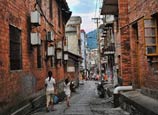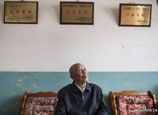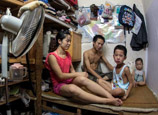
China aims to increase the country's total installed solar power generating capacity to more than 35 gigawatts (GW) by the end of 2015, the State Council said Monday, as part of a plan to support the sector, which is struggling with overcapacity and falling export orders.
The country had 8 GW of installed solar power generating capacity last year but will add 10 GW per year from 2013 to 2015 to reach the target, the State Council said in a plan released Monday.
The new target is much higher than the objective of 21 GW by the end of 2015 set by the National Energy Administration in 2012.
The annual objective of 10 GW is important to support the solar companies, which depend heavily on exports, Meng Xian'gan, deputy director of the China Renewable Energy Society, told the Global Times Monday.
The plan also said that the government will provide preferential taxation policies for solar companies to help expand the domestic market, as well as accelerating mergers and acquisitions in the sector.
It was the second time in just over a month that the central government has released supporting policies for the sector.
Almost all domestically listed solar companies saw their stock prices rise Monday following the news.
Overcapacity is still a major problem, so the government also needs to remove outdated capacity to ensure healthy development of the sector, Meng said, noting that leading enterprises should have strong technological innovation capabilities and a relatively big market share.
The US imposed anti-dumping tariffs on Chinese solar panel exports in 2012, and the EU also set an 11.8 percent tariff on Chinese solar panel exports starting from June 6, with the tariff set to rise to 47.6 percent after August 6 if both sides fail to reach an agreement.
The negotiations between China and the EU are still ongoing, and reaching a consensus depends on whether both parties can make concessions, Meng said.
Recent policies released by the central government are encouraging for the sector, as companies need to shift their focus to the domestic market amid declining external demand and trade disputes, Wang Zhao, sales director at Shanghai All-Zip Roofing Systems Group, a constructor of photovoltaic power stations, told the Global Times Monday.
However, it will take time for companies to feel the benefits of the policies, Wang said, adding that he hopes for further subsidy policies for solar power generation and bank financing policies for the sector.
Yingli Green Energy, one of China's largest solar equipment makers, told the Global Times Monday that they will intensify efforts to expand the domestic market.
The company said the domestic market accounted for 13 percent of its total sales in the first quarter, and the proportion is expected to grow to 33 percent in the second quarter, while the proportion for the EU market is expected to fall to 35 percent or lower in the second quarter from 53 percent in the first quarter.
















 College student car models show youthful vigor
College student car models show youthful vigor


![]()
